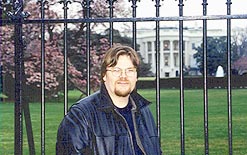"All that is old and already formed can continue to live only if it allows within itself the conditions of a new beginning."
President Nixon's Katrina Speech
Posted 5:51 p.m., Sept. 16, 2005
|
President Nixon gave a marvelous speech last night.
I know it's fashionable to compare the immense $200 billion program of social reconstruction that George W. Bush laid out last night to something out of the Lyndon B. Johnson or Franklin D. Roosevelt presidencies, and those are valid comparisons. Indeed, the president's Gulf Opportunity Zone is a program, as the conservative commentator Joe Scarborough said on MSNBC last night, that looks like "the WPA on steroids."
(The WPA, or Works Progress Administration, was the massive New Deal program in which the government hired millions of unemployed Americans to construct public works projects, and often to create public artworks. I grew up amid Northern Wisconsin pine forests that stood in rigid ranks, like soldiers at attention, because of a WPA program called the Civilian Conservation Corps.)
But no, this was a Nixon moment through and through. Which incidentally, doesn't mean it was a bad speech. It was a great speech, albeit one delivered by a vaguely disembodied president in shirtsleeves, before the bizarre Gothic backdrop of an abandoned and utterly undamaged church in the New Orleans French Quarter.
Why it was Nixonian to these ears is because I think I detect Nixonian aims.
I suspect that President Bush hopes to buy back the trust and affection of the American people through massive federal expenditures--he's done this before, think Medicare expansion--in order to allow him to pursue his two genuine policy priorities: further tax cuts and continuing his permanent war.
Take away the tax-cutting--Tricky Dick raised 'em, stirring animosity among Goldwater conservatives everywhere--this all seems consummately Nixonian.
But, just like Nixon ultimately discovered, it's not going to work.
If You Can't Say Something Nice
Let's talk a minute about what was good about last night's speech, because there were several very good things there:
Bringing in the military
"It is now clear that a challenge on this scale requires greater federal authority and a broader role for the armed forces--the institution of our government most capable of massive logistical operations on a moment's notice."
-- President George W. Bush,
Sept. 15, 2005This is ticklish, and likely will inflame some of both my liberal and conservative friends. But I agree with the president.
My Republican friend Howard Owens has commented on these pages that to bring on the military under such circumstances would violate the 1878 Posse Comitatus law--a law with a filthy provenance that initially aimed to thwart Federal intervention against Ku Klux Klan terrorism--but which nonetheless is an important and valid law, particularly in modern times in the face of a modern military. Posse Comitatus states that the U.S. military may not participate in arrests, searches and evidence seizures, or other police activity on U.S. soil.
But the president in his speech juggled that ball fairly well, even if his use of the word "challenge" in place of "catastrophe" might give the black-helicopter paranoia crowd room to freak out about his real intent. Katrina was a disaster on a scale so massive that only the U.S. military could have responded quickly and effectively to evacuate people or aid those stuck in place before they started to die. The president is right to overrule Don Rumsfeld on this one.
We're talking about rescue and recovery, not search and seizure. And as someone who's life was once saved by a federal agency called the U.S. Coast Guard--someday I'll tell that story here--I'm not opposed to using the military to save lives.
But Howard has a point. As Waco showed during the Clinton era, there must be strict conditions in place dictating under what circumstances we might allow our government to pull this lever. Still, Katrina showed--if 9/11 hadn't already--that we can't let an entire city descend into hell just to stand on libertarian, or worse bureaucratic principle.
As Howard proclaims, this stance might lack intellectual consistency. But recall Maslow's hierarchy. The researcher Maslow discovered that, faced with primal threats and dangers--lack of food, lack of shelter, lack of water--people drop all pretense about higher principals like intellectual consistency or spiritual fulfillment. (Theodore Roosevelt understood this, and campaigned on the theme of raising living standards of the poor "high enough to make morality possible.")
High-flown principles are the domain of the settled and comfortable. Without food, water or shelter, we're just a bunch of overeducated desert cliff dwellers. A little pragmatism here, please.
Demonstrating humanity This might be the best thing about Bush's speech. While it lacked any sort of energizing, we're-all-in-this-together-so-let's-get-busy rallying cry--a curious thing given what's being called for--the speech was effective on a human level. And while the misery of the Gulf Coast has been horribly obvious to anyone who has paid attention, the speech was refreshingly frank about that city's awful experience.
"We have seen fellow citizens left stunned and uprooted, searching for loved ones and grieving for the dead, and looking for meaning in a tragedy that seems so blind and random. We have also witnessed the kind of desperation no citizen of this great and generous nation should ever have to know: fellow Americans calling out for food and water, vulnerable people left at the mercy of criminals who had no mercy, and the bodies of the dead lying uncovered and untended in the street. ... You need to know that our whole nation cares about you, and in the journey ahead you are not alone."
-- President George W. Bush,
Sept. 15, 2005Those words show a kind of intangible leadership, but I think it's very real. By calling out our collective grief, the president is helping this country move on to healing. Don't underestimate how important that is. It's more than a wise strategic move, it is a neccesary step for the country, just as it was right for President Bush to forthrightly acknowledge the problems of race and poverty that played so big a role in this tragedy. These are the right things to say, and I am glad he said them.
Taking responsibility The president pretty much wiped out the raison d'être of my last column, in which I criticized his provisional mea culpa about the federal government's terrible response to the storm. Last night, he took direct, real and satisfactory responsibility for the federal government's failure in the Katrina crisis.
"Four years after the frightening experience of September the 11th, Americans have every right to expect a more effective response in a time of emergency. When the federal government fails to meet such an obligation, I as president am responsible for the problem and for the solution. So I have ordered every Cabinet secretary to participate in a comprehensive review of the government response to the hurricane."
-- President George W. Bush,
Sept. 15, 2005Kudos, Mr. President.
What Did He Say?
So much for the nicey-nice.
My conservative friends might be surprised that I'm not including on my list of positives Bush's Great Society initiative--this one the Grand Wazoo of all his big-spending plans, even bigger possibly than the Iraq war.
Why not? Well, because I'm not clear if it is a good thing or not.
Here is the deal. I think a lot of moderates and independents like me are going to look at the rebuilding of the Gulf Coast as priorities A, B and C during the rest of the Bush term. We're going to be willing to spend the money to make things right for our fellow citizens who are suffering so much.
But our posture is going to be, "OK, so something, probably several things, have got to give. What's it going to be? What are you going to ask us to give back to pay the bill?"
The president gave every indication today, during a press conference with Russian President Vladimir Putin, that he still believes nothing has to give. He still thinks that, even with Katrina destroying an area as large as Great Britain, that the tax-cutting, program-expanding, big-government-conservative crowd can simply party on like nothing happened.
There were several striking things about the press conference today. While Bush was obviously speaking extemporaneously and without a script, it was strange that in his discussion of recovery efforts, he suddenly dropped all talk of anti-poverty initiatives and home- and business ownership for blacks, in favor of strictly talking about repairing infrastructure. He also ratcheted down his references to direct aid to the victims. Last night he mentioned "up to $5,000" per person. Today he talked about just $2,000.
But here's the most striking of his post-speech comments today about the reconstruction effort.
"You bet it's going to cost money. And I'm confident we can handle it, and I'm confident we can handle our other priorities. It's going to be that we cut unneccesary spending. It's going to mean we've got to maintain economic growth. We should not raise taxes. Our working people have had to pay a tax in essence on higher gasoline prices. We don't need to be taking more money out of their pocket."
-- President George W. Bush,
Joint Bush/Putin press conference
Sept. 16, 2005This of course may explain that lack of a rallying cry to the American people, calling for sacrifices to bring the Gulf Coast--and by extension the heart of the U.S. shipping, river transport and petroleum industries--up off its knees. The president simply is not calling for greater sacrifice. Just greater political cover.
I guess that means that this shouldn't cost anybody anything beyond the $20-$50 or so they already gave to the Red Cross.
It's not a far leap from that thinking to renewing calls to make the earlier Bush tax cuts permanent, or to do away with the estate tax, or further expanding Medicare, possibly to cover hip replacements for cadavers. We can have all those things, and the war in Iraq, and rebuild the Gulf Coast, he seems to be saying, and trust me, America, it won't hurt a bit. Party on, dammit! Go shopping!
Enter Dr. Spin-good
It's been widely reported that chief White House spin doctor Karl Rove is going to head up the reconstruction effort. Aside from the fact that would be a little like putting me in charge of the engineering school at MIT, it demonstrates that this is really about two simultaneous efforts, both of which are classic Rove-style operations.
First, it will be a political initiative designed to shore up the president's poll numbers--in other words, a public relations program. (Wonder who gets attacked? Rove always attacks.) Second, it will serve as a laboratory for right-wing social experimentation.
On Washingtonpost.com today is a column by White House commentator Dan Froomkin that lays the riddle out succinctly.
"Consider two of the more extreme possibilities:
- "Either Bush is being entirely forthright, in which case he's talking about something reminiscent of the biggest liberal government programs of the 20th century. That scares some conservatives, certainly fiscal conservatives, to death.
- Or maybe it's just a plan to transform the Gulf Coast into a big test bed for conservative social policy, where tax breaks flow to big business and tax money flows to Halliburton, churches and private schools. That utterly terrifies liberals.
The argument that the administration will consider conservative ideological gains as a paramount consideration certainly gains credence when you consider ... that the White House's chief political strategist, Karl Rove, has apparently been put in charge of reconstruction plans."
-- Dan Froomkin,
"Mr. Big Government"
Washingtonpost.com
Sept. 16, 2005So maybe this "Gulf Opportunity Zone" will turn out to be in reality a "Gulf Opportunist's Zone." As Bush said last night, "We're going to be on the side of the entreprenuers." There's nothing inherently wrong with backing business, but it is really too bad that the president feels the need to choose sides.
I said earlier that this Nixonian bid to buy the people's affections is destined to fail. I draw further confidence in that notion from the fact that so many conservatives, from Tucker Carlson ("This was a guilt speech!") on down are rebelling against the president's plans. His religious right base is likely to stick with him because--nobly, I would argue--they will want to aid the victims. But the fiscal conservatives are going to want an accounting for this massive expenditure. (Also noble, to the extent that it's not simply about protecting one's own purse.)
Beyond any of this, it might simply be too late for Bush to win back the American public. This is the security president. There was no security in New Orleans. There is no security in Iraq. And we're really starting to doubt that there is security anywhere. The president has no clothes.
This is a crisis of confidence in his competence. Iraq is not going well, gas prices have risen, and now New Orleans. The most important thing in this [speech] is what he did not say. There is not a [reconstruction] 'czar.' That means, implicitly, [Bush] is the czar.If he can't convince the public that he can get the job done and lead the government, then whatever he proposes won't matter. It's going to fail."
-- Tony Blankley,
conservative columnist,
Washington Times
"Scarbourough Country," MSNBC
Sept. 15, 2005-- Kevin Featherly


